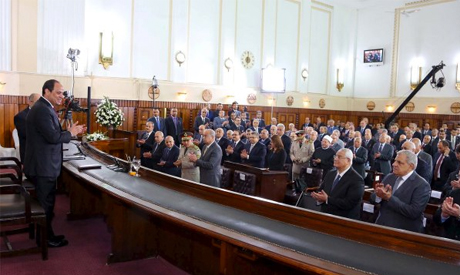
Egyptian President Abdel Fattah El-Sisi greets members of the Supreme Judicial Council before his speech during the celebration of the judicial day at the main headquarters of Supreme Court in downtown Cairo, Egypt April 23, 2016 (Egyptian Presidency)
Egypt's Judges Club, the body representing judges across Egypt, has expressed strong objections to a parliamentary committee passing a new judicial authority draft law that critics say undermines the independence of judiciary.
On Monday, the parliament's constitutional and legislative affairs committee voted in favour of the bill, which gives the president the right to appoint the heads of the country's judicial councils.
The council's move comes despite the fact that the country's State Council, the state advisory body that provides legal advice to the government, recommended against the passing of the draft bill.
The current judicial authority law stipulates that the heads of judicial bodies are selected based on seniority by their judicial councils and that the president ratifies the councils' selections.
However, the new draft law, presented in December 2016, empowers the president to pick from three candidates nominated by each of the four judicial councils: the State Lawsuits Authority, the administrative prosecution, the Court of Cassation – the country's top appeals court – and the State Council.
The Judges Club has called for an emergency meeting to discuss its next move with regards to the bill.
The move comes as a number of the country's judicial bodies, including the State Council and the Supreme Judicial Council, stressed their rejection of the amended draft law.
Judges against the bill say that putting the final decision of appointing the heads of judicial bodies in the hands of the president would eliminate the independence of the judiciary, making it a pawn in the hands of the executive authority.
The judicial bodies say the bill violates the independence of the judiciary and ignores seniority among judges.
Judges say the appointment of the heads of judicial councils should be solely based on seniority, as it eliminates the chance of competition or grudges between judges.
The draft law is yet to be voted on by parliament, after which it must be ratified by the president.
Mohamed Hamed El-Gamal, a veteran judge and a former head of Egypt's State Council, says that the state should acquire the approval of all judicial bodies on any law that regulates their affairs before it is put for a vote before parliament.
El-Gamal said that this law would violate the constitutional guarantee of an independent judiciary, and "if ratified there is a very high probability it will be challenged before the higher courts."
However, the senior judge says he expects parliament will pass the law regardless of the objections of the judicial councils.
Some MPs, however, argue that the consent of judicial bodies to the law is not mandatory under the constitution.
The MPs cite Article 185 of the constitution, which states that each judicial body or organisation shall merely be "consulted" when drafting bills regulating its affairs, but that their approval is not required.
Under the draft law, the judicial bodies must submit their nominations 60 days before the sitting head of the body leaves his post.
If any of the judicial councils does not present its nominations during this time, the president will have the right to automatically choose the head of the council from its seven most senior judges.
Short link: